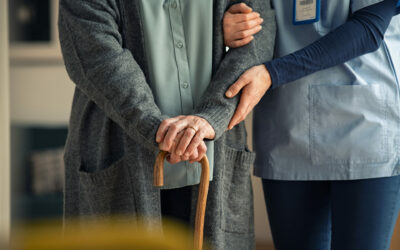Now that we’re in the throes of January, many people in Southern Ontario have to adjust to cold temperatures, inclement weather, and days with the fewest daylight hours. You might find yourself staying in more than you would during the summer.
For many people, it’s also a time when mental health symptoms start becoming more noticeable. If your elderly loved one is beginning to show signs of depression during the winter, they may have seasonal affective disorder (SAD).
Is seasonal affective disorder a form of depression?
Although SAD is considered to be linked to depression, it stands apart because the symptoms tend to set in or become worse over the winter months. In addition, it can affect people who show no or minimal signs of depression during the spring, summer, or fall.
Changes in daylight that disrupt the body’s circadian rhythm and trigger hormonal changes are thought to cause SAD. Lack of socialization and seemingly endless consecutive days of freezing temperatures can also play a role in developing the condition.
Are older people more at risk of SAD?
Although mental health doesn’t discriminate, older people are often particularly vulnerable to developing SAD because they’re often more isolated than younger people.
Older adults usually take fewer opportunities to socialize over the winter due to inclement weather, icy sidewalks that make walking dangerous, chronic illness, or mobility issues.
A lack of vitamin D from sunlight deficiency may also contribute to SAD. Although this deficiency is common in people of all ages, physical health changes that happen as we age put older people at an increased risk. Vitamin D helps manage mood and energy levels, so a deficiency can lead to symptoms that suggest depression.
What are the signs of seasonal affective disorder?
There are many signs to watch for that might indicate that your elderly loved one has developed SAD during the winter months. It’s crucial to monitor your loved one for any behavioural changes so you can take steps to help preserve their well-being.
Here are some of the more common symptoms of SAD:
- Feeling sad, hopeless, or guilty most of the time
- Difficulty concentrating
- Lack of energy
- Changes in sleeping habits (sleeping more or less than other times of the year)
- Loss of interest in pursuits they usually enjoy
- Restlessness or agitation
- Complaints of fatigue or “brain fog”
- Fluctuations in weight or appetite
It’s important to note that symptoms of depression are similar to many symptoms of dementia. The primary differentiator is that people with dementia usually present issues with memory, whereas people with depression do not. It’s always best to seek professional medical advice if your loved one behaves noticeably differently than usual.
Support for someone with SAD
Everyone deserves to feel good all year round. When someone we care about is struggling with a mental health condition, we can take steps to provide the support that can help reduce the symptoms. Taking them to the doctor is a great first step.
Your loved one’s primary care physician might suggest taking vitamin D supplements to help keep the person energized. They might also suggest at-home light therapy treatment with a lightbox.
Lightboxes emit light that has the same effect on one’s body as sunlight. Using it in the winter to increase our exposure to light can help regulate our circadian rhythm and manage the levels of certain hormones and neurotransmitters that affect our mood and energy levels. In many cases, sitting in front of the light box for about 30 minutes per day is enough to get the most out of light therapy.
You can also help your loved one make lifestyle changes that will improve their overall sense of well-being, protect their mental and physical health, and potentially reduce the symptoms of SAD.
For example, you can encourage them to eat nutritious meals to maintain focus and energy levels. You can also inspire them to participate in regular social interactions that will help boost their mood. Spending quality time with family and close friends is the perfect antidote for someone feeling the effects of SAD.
Finally, be sure to check in on someone with SAD on a regular basis. Whether in person, over the phone, or through Zoom, Skype, or FaceTime, frequent touchpoints that include smiles, laughter, and love go a long way to building strong bonds and provide a constant reminder that your elderly loved one is never alone.
Remember, you’re not alone in this. When you need help supporting a loved one with SAD, CareHop is only a phone call away.
Quality in-home elder care services in Etobicoke, Mississauga, and Brampton
CareHop specializes in providing quality eldercare services when families need a helping hand.
If your elderly loved one is feeling the effects of SAD, we can help by checking in and keeping them entertained and engaged with fun activities such as games, puzzles, cooking together, pleasant conversation, and much more. Our safe, reliable transportation and accompaniment services will get your loved one out of the house to medical appointments, social events, and other destinations.
CareHop’s elder care services are designed to positively impact your loved one’s life throughout the year or at certain times when you need us the most.
Contact us today for a free, no-obligation discussion to discover how we can help you.




